
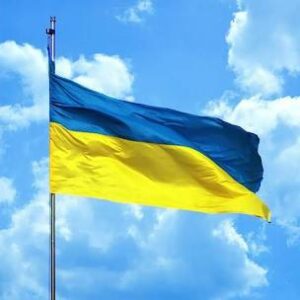
Pray for the suffering people of Ukraine and Gaza.
Saint Sisoes: Why?
We don’t know Sisoes’ * birthdate. We know he died in the year 429, and once confessed to having lived in the desert for 72 years – so you can count back.
- pronounced “SiSO-es”

When he was a youth he went into the Scetis desert * and lived some time under the direction of Abba Or, who shaped him in the monastic life. Then he felt the need for a place more isolated, so he crossed the Nile and hid himself in Mount Colzim, where Saint Anthony the Great, the first of the great Desert Fathers, had lived and died not long before.
- west of the Nile, some 75 miles south of Alexandria
Why ever would he do that? To many people that seems a complete waste. Haven’t we been commanded to love our neighbors as ourselves? What can monkx, almost entirely isolated from the world, possibly do for the rest of the human race?
For one thing, they can pray for us, they whose prayer life is often phenomenally better and more powerful than yours and mine. Jesus prayed much and taught us to pray. Who knows what their prayer has accomplished – is accomplishing – for the good of the world? * That, of course, we don’t know. The effect of prayer cannot be measured, not from here.
- When the Iraq War began Saint Paisios of Mount Athos, usually a convivial hermit, withdrew and spent his time in prayer.
For another thing, you should read the book In the Heart of the Desert: The Spirituality of the Desert Fathers and Mothers by Doctor John Chryssavgis. * Out of these people isolated from the outside world has come an enormous amount of practical wisdom about how to pray, how to live, how to forgive, and much more. Especially the value of silence. Our modern world is so busy-busy-busy that we scarcely have time to think why we’re busy. If you and I spent even a little more time silently with God, you and I would be a whole lot wiser than we are.
- available from many sources, Orthodox and otherwise
The Life of Saint Sisoes
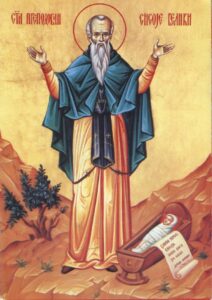
Abba * Sisoes was extremely strict with himself, spent much time in his cell alone with the door locked. However if people came to him, he always welcomed them with kindness, listened to them and gave advice in as few words as possible, sometimes in no words.
- “Abba” in Coptic (ancient Egyptian) and Aramaic is an intimate word for “father”, almost but not quite like “daddy” in English. Like “papa”, perhaps?
Often he was so caught up in prayer that he forgot to eat. After two days his disciple Abraham would say to him, “Abba, get up, and let us eat.” Sisoes would say to him, “Have we not eaten, my child?” He would reply, “No, Father.” Then the old man would say, “If we have not eaten, bring the food, and we will eat.”
Abba Sisoes was sitting in his cell one day. His disciple knocked on the door and the old man shouted out to him saying, “Go away, Abraham, do not come in. I have no time now for the things of this world.”
To buy the necessities, Abba Sisoes made baskets, which he did not enjoy. He taught that people should do work they do not enjoy. *
- I hope that’s not true. I have spent most of my life doing work I enjoyed – being a husband and father and pastor, and also what I’m doing right now: composing this Blog Post.
Saint Sisoes said one time, “I am now thirty years praying daily that my Lord Jesus may preserve me from saying an idle word, and yet I am always relapsing.”
One of Sisoes’ greatest virtues was his humility. Just observing the virtues of his disciples made him deplore his own imperfections. Once three novice monks spoke to him of their fear of condemnation to hellfire. Saint told them he had never thought much about that. “I know that God is merciful,” he said, “I trust He will have compassion on me.” But their question made him wonder if he should have the same fear, and he blamed his own spiritual insensitivity for not doing so. “This”, he said, “is perhaps the reason I am guilty of so much sin.”
One time some Arians came to his mountain, trying to convince him of that heresy. Sisoes, instead of arguing with them, had one of the monks read Saint Athanasius’ treatise against Arianism, which confounded them and left them with nothing to say. So he dismissed them with his usual good temper.
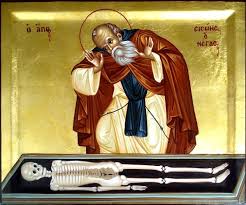
Icons of Saint Sisoes are not easy to find, except for this strange one showing him standing over the grave of Alexander the Great, the great Emperor’s bare bones lying before him. The inscription on the icon reads: “Sisoes, the great ascetic, before the tomb of Alexander, King of the Greeks, who was once covered in glory. Astonished, he mourns for the vicissitudes of time and the transience of glory, and tearfully declaims thus: The mere sight of you, tomb, dismays me and causes my heart to shed tears, as I contemplate the debt we, all men, owe. How can I possibly stand it? Death! who can evade you?” What had died, of course, was not only Alexander but also his Empire – and all earthly empires. The icon was popular in Greek monasteries after the Fall of Constantinople and the Byzantine Empire, for obvious reason.
Did this represent an actual event? Quite possibly. Alexander’s tomb was originally in Memphis, Egypt, then at some time probably moved to Alexandria. Perhaps in his youth Sisoes had visited there, and it had made such a profound impression on him that he later spoke about it.
______________
A man and his son came to see Abba Sisoes on Abba Anthony’s mountain. On the way, it happened that his son died. The man was not troubled by this but brought him with confidence to the old man and bowed down with his son, as though making prostration, so that he would be blessed by the old man. Then the father stood up, left the child at the old man’s feet and went outside in trust. Sisoes did not realize the boy was dead, but thought he was only bowing, so he said to him, “Get up, go outside.” Immediately the boy stood up and went out. When he saw it, his father was filled with amazement and went back inside, bowed before the old man and told him the whole story. When Sisoes heard it, he seemed startled. He said he had not intended that to happen, and he asked the father never to speak of it to anyone before his death.
A brother asked Abba Sisoes, “Why did you leave Scetis where you lived with Abba Or and come to live here?” The old man said, At the time when Scetis became crowded, I heard that Anthony was dead, so I got up and came here to the mountain. Finding the place peaceful I have settled here for a little while.” The brother said to him, “How long have you been here?” The old man said to him, “Seventy-two years.”
When Abba Sisoes got old and his health was failing, his disciple Abraham advised that they move to the nearby town of Clysma, where it would be easier for him to get medical care. Sisoes was miserable there. “Did not the ease of mind I had there provide everything for my comfort?” So they went back to their retreat on Saint Anthony’s mountain.
When Saint Sisoes lay upon his deathbed, the disciples surrounding him saw that his face was shining. They asked what he saw. Abba Sisoes replied that he saw Saint Anthony, the prophets, and the apostles.
His face increased in brightness, and he spoke with someone. The monks asked, “With whom are you speaking, father?” He said that angels had come for his soul, and he was entreating them to give him a little more time to repent. The monks said, “You have no need to repent, father.” Saint Sisoes answered, “I do not think that I have even begun to repent.”
After these words the face of the holy Abba shone so brightly that the brethren were not able to look upon him. Saint Sisoes told them that he saw the Lord Himself. Then there was a flash like lightning, and a fragrant odor, and Abba Sisoes departed to the Heavenly Kingdom. It was July 6, in the Year of Our Lord 429.
Some Sayings and Teachings of Saint Sisoes the Great
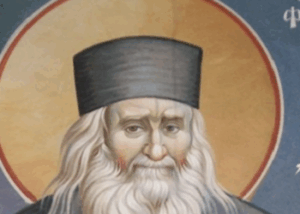
Abba Sisoes expressed himself freely one day, saying, “For thirty years I have not prayed to God about my faults, but I have made this prayer to him: ‘Lord Jesus, save me from my tongue,’ for until now every day I fall because of it and commit sin.”
Someone went to see Abba Sisoes on Abba Anthony’s mountain. While they were talking, he said to Abba Sisoes, “Have you already reached Abba Anthony’s stature, Father?” The old man said to him, “If I had one of Abba Anthony’s thoughts, I should become all flame. But I do know a man, who with difficulty is able to bear Anthony’s thoughts.” He never told who that man was.
Saint Sisoes was hard on himself but merciful to others. A brother had committed some sin. The brothers asked Abba Sisoes how long he should do penance. * “Surely for a year?” He replied, “That is a hard saying.” They asked again, “For six months?” He replied, “That is a great deal.” They said, “For a month?” He said, “That is a great deal, too.” They said to him, “What then?” The old man said to them, “I think he should do penance for a few days. I trust God that if he repents with his whole heart, God will receive him, even in three days.”
- some form of mortification, apparently including exclusion from the Holy Eucharist
A brother asked Abba Sisoes, “Did Satan pursue Christians like this in the early days?” The old man said to him, “He does this more at the present time, because his time is nearly finished and he is enraged.”
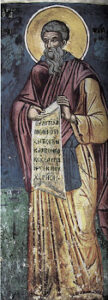
Abraham, Abba Sisoes’ disciple, was tempted one day by the devil, and the old man saw that he had given way. Standing up, he stretched his hands towards heaven, saying, “God, whether You will it, or whether You will it not, I will not let You alone till You have healed him”, and immediatelyAbraham was healed.
A brother said to Abba Sisoes, “The remembrance of God stays with me.” The old man said to him, “It is no great thing to be with God in your thoughts. The great thing is to see yourself as inferior to all creatures. This, coupled with hard work, leads to humility.”
Abba Ammoun of Rhaithou asked Abba Sisoes, “When I read the Scriptures, my mind is wholly concentrated on the words so that I may have something to say if I am asked.” The old man said to him, “That is not necessary. It is better to enrich yourself through purity of spirit and to be without anxiety and then to speak.”
He also said, “When there is someone who takes care of you, you are not to give him orders.”
One of the Fathers asked Abba Sisoes, “If I am sitting in the desert and a barbarian comes to kill me and if I am stronger than he, shall I kill him?” The old man said to him, “No, leave him to God. In fact whatever the trial is which comes to a man, let him say, ‘This has happened to me because of my sins,’ and if something good comes say, ‘It is through the providence of God.'”
A brother asked Abba Sisoes, “Give me a word,” and he said, “What shall I say to you? I read the New Testament, and then I turn to the Old.”
A brother asked Abba Sisoes, “What shall I do, Abba, for I have fallen?’ The old man said to him, “Get up again.” The brother said, “I have got up again, but I have fallen again.” The old man said, “Get up again and again.” The brother asked, “How many times?” The old man said, “Until you are taken up either in virtue or in sin. For a man presents himself to judgment in the state in which he is found.”
Abba Sisoes said, “Seek God, but do not seek where He dwells.”
A brother asked Abba Sisoes, “What am I to do?” He said to him: “What you need is a great deal of silence and humility. For it is written: ‘Blessed are those who wait for Him’ (Isaiah 30.18) for thus they are able to stand.”
Abba Sisoes said, “Let yourself be despised, cast your own will behind your back, and you will be free from care and at peace.”
A brother asked Abba Sisoes to give him a word. He said, “Why do you make me speak without need? Whatever you see me do, do that.”
One day Abba Abraham, Abba Sisoes’ disciple, went away on an errand. During his absence the old man did not wish to be served by anyone else. “Shall I let any other man, except my brother, get used to me?” He refused till his disciple returned, and put up with the hardship.
Abba Sisoes said to a brother, “How are you getting on?” and he replied, “I am wasting my time, father.” The old man said, “If I happen to waste a day, I am grateful for it.”
Through the prayers of Our Holy Abba Sisoes the Great, O Christ our God, have mercy upon us and save us.
Next Week: The Holy Martyr the Grand Duchess Elisabeth of Russia
Week after Next: Probably we’ll finally conclude My First Trip to Greece: Saint Nicholas Takes Charge.
Sources for this Post:
orthodoxpath.org
”orthodoxwiki.org?
https://saints-alive.siministries.org/saints-alive/saint/st-sisoes/
adayinthelifeoftheyouthdirector.blogspot.com.
johnsadinopoulos.com